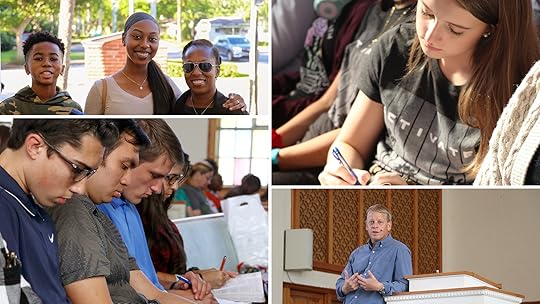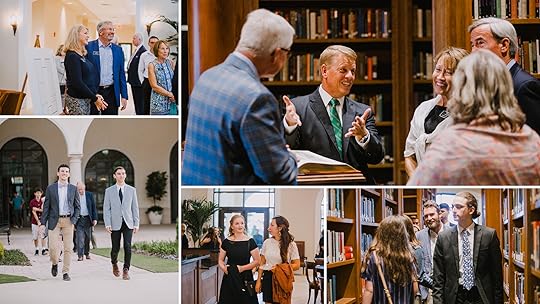R.C. Sproul's Blog, page 104
December 19, 2019
$5 Friday: The Holiness of God, Worship, & Redemption

It’s time for our weekly $5 Friday sale. This week’s resources include such topics as the holiness of God, worship, redemption, regeneration, John Calvin, baptism, and more.
Sale runs through 12:01 a.m. — 11:59 p.m. Friday ET.
View today’s $5 Friday sale items.


God the Holy Spirit
Here’s an excerpt from God the Holy Spirit, Robert Letham's contribution to the December issue of Tabletalk:
The Holy Spirit subsists in the indivisible Trinity as one of the three hypostases (persons). As such, He is fully and exhaustively God, one in being eternally with the Father and the Son, one in power and glory. Whatever God does, the Spirit does, since in all God’s works all three persons work together inseparably, whether in creation, providence, or salvation. Therefore, when we speak of the Spirit at work, we must always remember that the Father and the Son are also involved.
Nevertheless, the Holy Spirit is not the Father, and He is not the Son either, for the three are eternally distinct. There is but one God, so the Spirit is identical in being or essence with the Father and the Son, but in terms of personhood, He is irreducibly distinct. Thus, there are actions attributed (or appropriated) peculiarly to the Spirit—only He was sent at Pentecost—but even here He was sent by the Father through and in the Son.
In terms of the eternal relations of the three, the Spirit proceeds from the Father (John 15:26). In this sense, the Spirit is from the Father, a relation that entails no element of subordination, inferiority, or temporal precedence but rather points to a relational and hypostatic (personal) order. This is something beyond our capacity to understand, as it occurs in the mystery of the internal life of God. However, by faith we seek to understand.
In line with this eternal procession, the Father sends the Spirit, through and in the Son, in relation to all His works in creation, including our redemption (Acts 1:8; Gal. 4:4–6). This is known as a mission(sending).
As noted, the Son is also actively engaged with the Father in the sending of the Spirit. Jesus refers to the Father’s sending the Spirit at Pentecost in response to His request or in His name (John 14:16, 26). He also says that He Himself will send the Spirit (16:7), and later He breathes on the disciples and says, “Receive the Holy Spirit” (20:22).
Continue reading God the Holy Spirit, or begin receiving Tabletalk magazine by signing up for a free 3-month trial.
For a limited time, the new TabletalkMagazine.com allows everyone to browse and read the growing library of back issues, including this month’s issue.


December 18, 2019
Save Up to 50% on Gift Subscriptions to Tabletalk

Take care of your whole Christmas list and make 2020 a year of engaging Bible study when you send Tabletalk magazine to your family and friends. For a limited time, give one twelve-month subscription and get the rest 50% off.
THEY'LL RECEIVE
A gift notification email sent to the recipient
Twelve issues of Tabletalk with digital access to current and past months
An effective plan for reading through the Bible in one year
Daily Bible studies to help bring structure to their Scripture reading in 2020
Monthly articles and columns from gifted Bible teachers and pastors
When you send Tabletalk magazine to your friends and family, you give them an affordable gift that lasts all year. In 2020, monthly themes will provide Scriptural wisdom on significant topics such as fear, misunderstood doctrines, and Jesus’ parables.
Give a gift subscription now for $23 and save more than $10 on each additional subscription. This special offer ends January 31, 2020. Limited to ten gift subscriptions.
Give Tabletalk


What We Celebrate at Christmas
In this excerpt from What Did Jesus Do?, R.C. Sproul reminds us that what we really celebrate at Christmas is the incarnation of God Himself.
Transcript
What we celebrate at Christmas is not so much the birth of a baby, as important as that is, but what's so significant about the birth of that particular baby is that in this birth we have the incarnation of God Himself. An incarnation means a coming in the flesh. We know how John begins His gospel, "In the beginning was the Word, and the Word was with God, and the Word was God." So in that very complicated introductory statement, he distinguishes between the Word and God, and then in the next breath identifies the two, "The Word was with God, and the Word was God." And then at the end of the prologue, he says, "And the Word became flesh and dwelt among us." Now in this "infleshment," if you will, of Christ appearing on this planet, it's not that God suddenly changes through a metamorphosis into a man, so that the divine nature sort of passes out of existence or comes into a new form of fleshiness. No, the incarnation is not so much a subtraction as it is an addition, where the eternal second person of the Trinity takes upon Himself a human nature and joins His divine nature to that human nature for the purpose of redemption.
In the 19th century, liberal scholars propounded a doctrine called the kenotic theory of the incarnation, and you may have heard it, the idea being that when Jesus came to this earth, He laid aside His divine attributes so that the God-man at least touching His deity no longer had the divine attributes of omniscience, omnipotence, and all the rest. But of course, that would totally deny the very nature of God, who is immutable. Even in the incarnation, the divine nature does not lose His divine attributes. He doesn't communicate them to the human side. He doesn't deify the human nature, but in the mystery of the union between the divine and the human natures of Jesus, the human nature is truly human. It's not omniscient. It's not omnipotent. It's none of those things. But at the same time, the divine nature remains fully and completely divine. B. B. Warfield, the great scholar at Princeton, in remarking on the kenotic theory of his day said, "The only kenosis that that theory proves is the kenosis of the brains of the theologians who are propagating it."—that they've emptied themselves of their common sense.
But in any case, what is emptied is glory, privilege, exaltation. Jesus in the incarnation makes Himself of no reputation. He allows His own divine exalted standing to be subjected to human hostility and human criticism and denial. "He took the form of a bondservant and coming in the likeness of men." This is an amazing thing that He doesn't just come as a man, He comes as a slave. He comes in a station that carries with it no exaltation, no dignity, only indignity. "And being found in appearance as a man, He humbled Himself and became obedient even to the point of death," the shameful death of the cross.


The Incarnation: The Athanasian Creed

When you set out to know someone, you usually want to know where they came from and what they are like. Such information is far from trivial. Instead, it becomes the blood that pulses through the heart of the relationship. When we ask the typical “getting to know you” questions about Christ, we find the answers are given in the doctrine of the incarnation (a word that simply means “in flesh”). Incarnation describes what happened when the second person of the Trinity left the bliss of heaven for some thirty-three years to enter, as one of us, the mess of the human condition.
The historic Christian doctrine of the incarnation can be expressed in a few simple phrases that the Western church codified in the Athanasian Creed (hereafter Ath. Cr.) around the sixth century.
Christ Is True God
Jesus of Nazareth is of the same substance as the Father, equal to Him in deity (Ath. Cr. 31, 33). Christ is not a lesser God. When the second person of the Godhead became a man, God didn’t compromise Himself and change into something lesser than He was. Christ is “the image of the invisible God” (Col. 1:15). “In him dwells all the fullness of the Godhead bodily” (Col. 2:9). He is the “brightness of [God’s] glory and the express image of his person” (Heb. 1:3).
God reveals Himself as a triune being: Father, Son, and Holy Ghost. “The whole three persons are co-eternal, and co-equal” (Ath. Cr. 26). In the incarnation, Christ did not shed His glory as a snake sheds its skin; He veiled His glory in humanity. Those who see Jesus see God (John 14:9).
Christ Is True Man
Jesus isn’t almost like us. He didn’t come as close to experiencing full humanity as God could come without going all the way. He had a real body and soul (Ath. Cr. 32) because He was really human. Jesus’ conception was extraordinary (Matt. 1:20); the rest of His development as a man was mundanely human. The Bible describes His birth in very typical fashion. “When the fullness of time had come God sent forth His son, born of a woman” (Gal. 4:4). He was nourished from Mary’s body. He matured through the same phases as others. He was subject to pain, pleasure, hunger, thirst, fatigue, disappointment, suffering, and death. He thought, reasoned, and felt as a man. The Bible puts it plainly: “In all things He had to be made like His brethren” (Heb. 2:17) because only as a real man could Christ be “in all points tempted as we are, yet without sin” (Heb. 4:15).
Christ Is One Person with Two Natures
The relation of Christ’s natures to His person is mysterious, but it is important. If we fail to recognize the unity of Christ’s person, we might see Him as divine with some human characteristics or as human with some divine characteristics or as a confused combination of the two. Jesus is one Christ with both a human nature and a divine nature, and these natures do not bleed together. In Christ, God added to Himself our humanity, while continuing to be God.
Highlighting the relevance of the incarnation, the Athanasian Creed transitions seamlessly from Christ’s person to His work. During the whole of Jesus’ earthly ministry (and into eternity), Christ the God-man secures salvation for His elect. He acts as man, because it is man who needs salvation. But, for a mere human, however infused with divine help, the call of duty is too great. Only God could provide man’s remedy. In Christ, God and man meet, and sinners are saved.
Rev. William Boekestein is pastor of Covenant Reformed Church in Carbondale, Pa. He is co-author of Why Christ Came.


December 17, 2019
God the Son
Here’s an excerpt from God the Son, Brandon D. Crowe's contribution to the December issue of Tabletalk:
I remember my perplexity when I first encountered the doctrine of the Son’s eternal generation (i.e., being eternally begotten of the Father). I was preparing for seminary by reading Louis Berkhof’s classic Systematic Theology, and I found the topic overly speculative. I recognized the importance of affirming that the Son of God is not a creature but is Himself God. But I could not conceive why it was necessary to discuss the nature of the Son’s begetting in such detail. Where in the Bible would one get such an idea? And why does it matter?
It turns out that it matters a great deal and that it’s not as speculative as it may seem at first.
Continue reading God the Son, or begin receiving Tabletalk magazine by signing up for a free 3-month trial.
For a limited time, the new TabletalkMagazine.com allows everyone to browse and read the growing library of back issues, including this month’s issue.


December 16, 2019
Your Support Helps Send Trusted Teaching to Millions of People Near and Far

“God allows us to participate in the greatest work in human history, the work of redemption.”
You may have heard Dr. Sproul say that. He frequently reminded us of this great work, namely, the honor and privilege of carrying out the evangelization and discipleship of the nations under the authority of Jesus Christ and in the power of His Word and Spirit. It’s breathtaking if you stop and think about it.
You and I carry out this great work as we serve the Great Commission’s purpose to go and make disciples of all nations. And here on the cusp of a new decade, one way you can assist in carrying out this work is by supporting the urgent and needed outreach of Ligonier Ministries.
Your support today is critical for extending our outreach into the next decade and beyond. Standing with us now by giving a donation of any amount to Ligonier’s work will help us meet our year-end need and start 2020 strong.
No doubt, 2020 will be a landmark year. While much of the world’s attention will be given to upcoming elections, you and I know that Jesus Christ is King, actively working to build His church. Out of a love for God and for those who are lost, we must uphold the cause of truth and the clear proclamation of the gospel. People inside and outside the church need to know who God is. We need you to step with Ligonier into this new year of ministry opportunity.
We know that both the root of humanity’s turmoil and the answer to it are primarily theological, not political. All around us, we see the fruit of lives lived without sound doctrine directing them, including the deterioration of human dignity and the loss of compassion for the most vulnerable among us, especially the unborn. Because Jesus is the light of the world, Christians will shine as a light in the world, and the church will be a refuge for the weary, humble, and contrite in spirit—but only if we understand God’s Word rightly and trust in Him for solutions to our problems.
At times like this, it can be easy for the people of God to lose confidence and grow anxious. I’m sure that you, like me, have wondered what the years ahead will mean for the next generation in the church. But we need not lose hope. We must “hold fast the confession of our hope without wavering, for He who promised is faithful” (Heb. 10:23).
Scripture reveals to us a God of towering majesty who is working out His perfect will, a sovereign God whose purposes can never be thwarted. Our confidence and comfort will only be as great as our view of the Lord and His plan. We need an immense theology—a grand view of God—in order to not be shaken and to hold out hope to our neighbors.
Ligonier Ministries has proclaimed this big theology of the sovereign, holy, and gracious God in 2019, and, by His grace, we’ll do the same in 2020 and in the years to come to even more people.
Just look at some of the ways your support of Ligonier’s gospel outreach has enabled expansion:
You have helped us activate ministry projects in forty languages now. In fact, the growth of the dedicated Arabic outreach we launched in the spring and the launch of a dedicated outreach in Farsi just a couple weeks ago is remarkable. This secures a strategic foothold to equip Christians in the Arab world and in Iran with key discipleship resources. The response is overwhelming. Iran is said to have “the fastest-growing evangelical church in the world.” Many new converts from Islam listen to Dr. Sproul regularly.
You advanced the colossal translation project of a Spanish edition of the Reformation Study Bible . With this translation recently completed, we’re preparing to launch this key resource in one of the world’s most spoken languages in summer 2020.
You enabled us to hold conferences and pastor training events not only in the United States but also in London and Toronto, bringing needed reinforcements to Christians in areas where many believers are under siege by aggressive secularism.
You played a significant role in Reformation Bible College’s welcoming its largest incoming class of freshmen and opening its new building, including more classrooms and a large library, debt free. Dr. Sproul’s vision for the college continues to flourish as we raise up a generation of knowledgeable and articulate Christians.
Your visionary support gave us the confidence to meet the recent explosive interest in podcasts by strategically expanding our team and resources. This year marked the twenty-fifth anniversary of Renewing Your Mind , an outreach used by God to reach millions of people with life-transforming truth. We also launched the Simply Put podcast to help Christians understand key theological terms and apply them to daily life, and we’re preparing to launch additional podcasts in the months and years to come.
You bolstered the production of several new teaching series and the publication of many new books, including the new single-volume edition of Dr. Sproul’s Truths We Confess . Ligonier’s rich library of trusted teaching deepens every week, all thanks to your support.
That barely scratches the surface. I wish I could sit down with you over a cup of coffee and talk about all the doors that the Lord is opening for Ligonier around the world. We give thanks to God for you and for the way you enable this unique ministry to equip growing Christians with His answers to the most important questions people ask and to help churches continue to advance the Great Commission.
We need your support now to make the most of these opportunities to reach a dying world and to ground Christians in a view of God that is as massive as the Bible presents. Something else R.C. often said is that if someone donates $100, we can do $100 worth of ministry—but what we cannot do is $101 worth of ministry.
We will grow and expand as the Lord allows through the support of His people. We rely on His faithfulness to sustain us. All of us at Ligonier count on ministry supporters such as you who understand the value and eternal impact of this critical work. Unless people like you stand with us, we cannot do what we do.
We believe that God has great things in store for Ligonier Ministries in 2020 and beyond. Your support will send trusted teaching to millions of people near and far. Never underestimate the reach of your gift, no matter the size. The Lord is mighty, and He does mighty things with the generosity of His people.
Thank you for your support now for this vital outreach.
DONATE NOW


Did King Saul Really Talk to the Spirit of Samuel, Or Was it a Demonic Impersonation?

King Saul’s meeting with the witch of En-dor was absolutely forbidden by God. But what exactly took place there? From one of our Ask R.C. events, R.C. Sproul explores what we can and cannot know from the account in 1 Samuel 28.
To get real-time answers to your biblical and theological questions, just ask Ligonier. Visit Ask.Ligonier.org.
Read the Transcript


Final Day to Save up to 50% on Reformation Study Bibles

Today is the final day to get select cover styles of the Reformation Study Bible and the Condensed Edition on sale for up to 50% off. Edited by Dr. R.C. Sproul and drawing from the wisdom of 75 distinguished theologians, the Reformation Study Bible elevates Scripture on every page by providing comprehensive and trustworthy commentary, accessible to every reader. Order yours while supplies last.
As an added bonus, when you register your Reformation Study Bible, you unlock access to a library of discipleship resources valued at over $400.
This special sale includes our three most recent leather-like cover styles of the Condensed Edition: forest, plum, and black.
Shop Now
Sale ends December 16, 2019


The Foundation for the Joy of Christmas

Along with the great theologian and philosopher Anselm of Canterbury we ask the question, Cur deus homo? Why the God-man? When we look at the biblical answer to that question, we see that the purpose behind the incarnation of Christ is to fulfill His work as God’s appointed Mediator. It is said in 1 Timothy 2:5: “For there is one God and one Mediator between God and men, the Man Christ Jesus, who gave Himself ….” Now, the Bible speaks of many mediators with a small or lower case “m.” A mediator is an agent who stands between two parties who are estranged and in need of reconciliation. But when Paul writes to Timothy of a solitary Mediator, a single Mediator, with a capital “M,” he’s referring to that Mediator who is the supreme Intercessor between God and fallen humanity. This Mediator, Jesus Christ, is indeed the God-man.
In the early centuries of the church, with the office of mediator and the ministry of reconciliation in view, the church had to deal with heretical movements that would disturb the balance of this mediating character of Christ. Our one Mediator, who stands as an agent to reconcile God and man, is the One who participates both in deity and in humanity. In the gospel of John, we read that it was the eternal Logos, the Word, who became flesh and dwelt among us. It was the second person of the Trinity who took upon Himself a human nature to work out our redemption. In the fifth century at the Council of Chalcedon in 451, the church had to fight against a sinister teaching called the Monophysite heresy. The term monophysite is derived from the prefix mono, which means “one,” and from the root phusis, which means “nature” or “essence.” The heretic Eutyches taught that Christ, in the incarnation, had a single nature, which he called a “theanthropic nature.” This theanthropic nature (which combines the word theos, meaning “God,” and anthropos, meaning “man”) gives us a Savior who is a hybrid, but under close scrutiny would be seen to be one who was neither God nor man. The Monophysite heresy obscured the distinction between God and man, giving us either a deified human or a humanized deity. It was against the backdrop of this heresy that the Chalcedonian Creed insisted Christ possesses two distinct natures, divine and human. He is vere homo (truly human) and vere Deus (truly divine, or truly God). These two natures are united in the mystery of the incarnation, but it is important according to Christian orthodoxy that we understand the divine nature of Christ is fully God and the human nature is fully human. So this one person who had two natures, divine and human, was perfectly suited to be our Mediator between God and men. An earlier church council, the Council of Nicea in 325, had declared that Christ came “for us men, and for our salvation.” That is, His mission was to reconcile the estrangement that existed between God and humanity.
It is important to note that for Christ to be our perfect Mediator, the incarnation was not a union between God and an angel, or between God and a brutish creature such as an elephant or a chimpanzee. The reconciliation that was needed was between God and human beings. In His role as Mediator and the God-man, Jesus assumed the office of the second Adam, or what the Bible calls the last Adam. He entered into a corporate solidarity with our humanity, being a representative like unto Adam in his representation. Paul, for example, in his letter to the Romans gives the contrast between the original Adam and Jesus as the second Adam. In Romans 5, verse 15, he says, “For if by the one man’s offense many died, much more the grace of God and the gift by the grace of the one Man, Jesus Christ, abounded to many.” Here we observe the contrast between the calamity that came upon the human race because of the disobedience of the original Adam and the glory that comes to believers because of Christ’s obedience. Paul goes on to say in verse 19: “For as by one man’s disobedience many were made sinners, so also by one Man’s obedience many will be made righteous.” Adam functioned in the role of a mediator, and he failed miserably in his task. That failure was rectified by the perfect success of Christ, the God-man. We read later in Paul’s letter to the Corinthians these words: “And so it is written, ‘The first man Adam became a living being.’ The last Adam became a life-giving spirit. However, the spiritual is not first, but the natural, and afterward the spiritual. The first man was of the earth, made of dust; the second Man is the Lord from heaven. As was the man of dust, so also are those who are made of dust; and as is the heavenly Man, so also are those who are heavenly. And as we have borne the image of the man of dust, we shall also bear the image of the heavenly Man” (1 Cor. 15:45).
We see then the purpose of the first advent of Christ. The Logos took upon Himself a human nature, the Word became flesh to effect our redemption by fulfilling the role of the perfect Mediator between God and man. The new Adam is our champion, our representative, who satisfies the demands of God’s law for us and wins for us the blessing that God promised to His creatures if we would obey His law. Like Adam, we failed to obey the Law, but the new Adam, our Mediator, has fulfilled the Law perfectly for us and won for us the crown of redemption. That is the foundation for the joy of Christmas.
This post was originally published in Tabletalk magazine.


R.C. Sproul's Blog
- R.C. Sproul's profile
- 1931 followers





